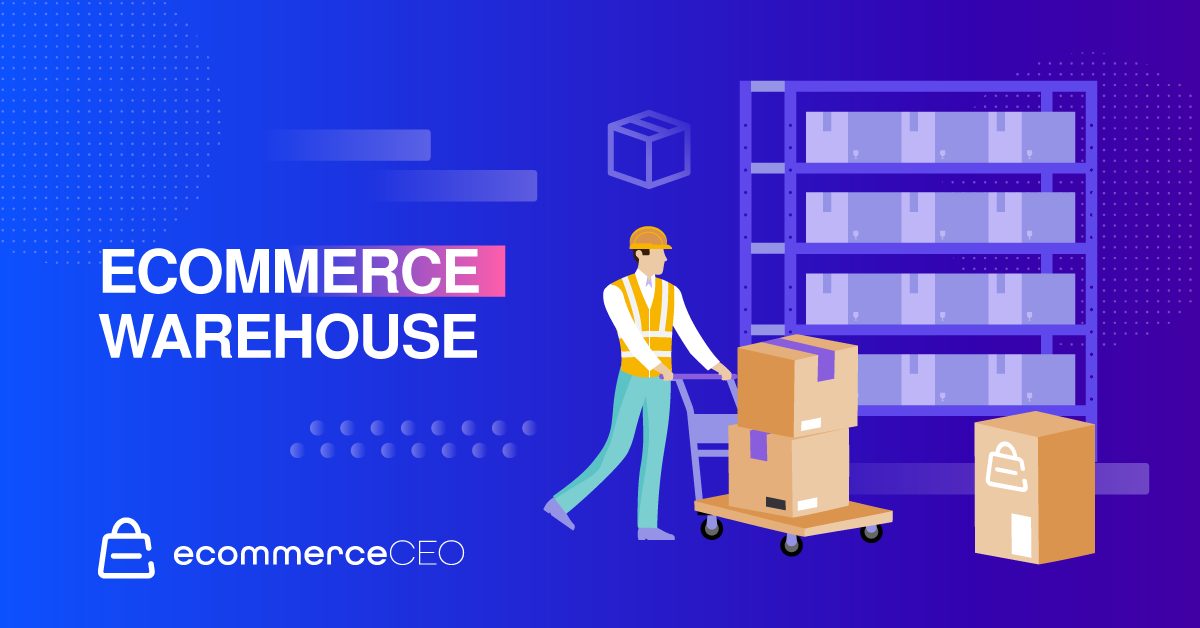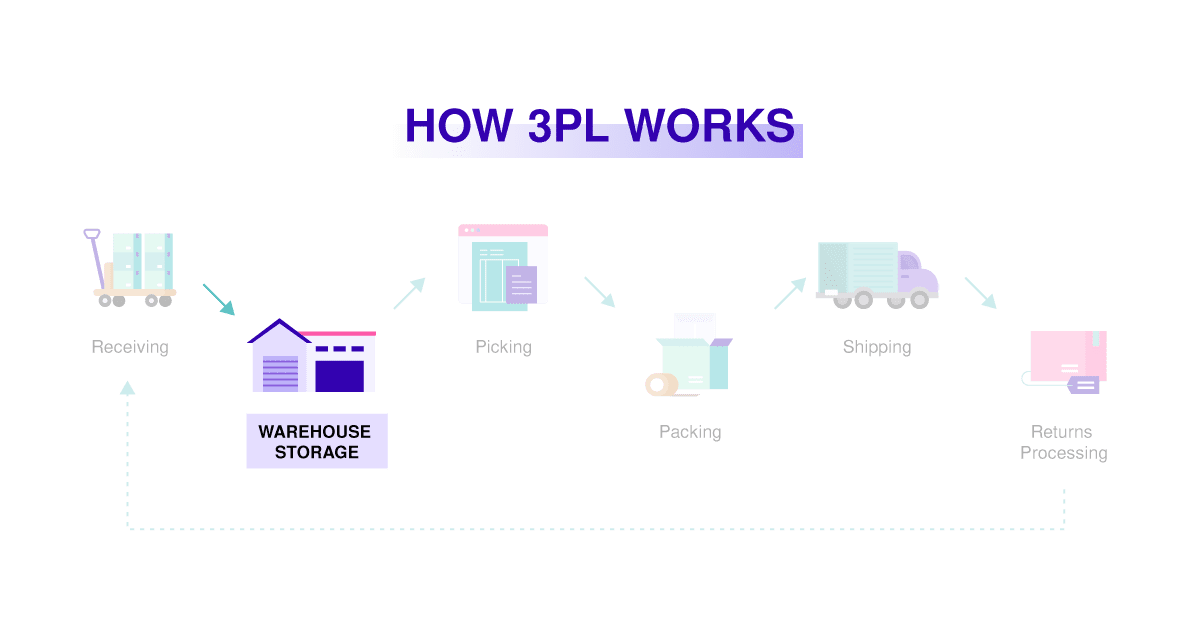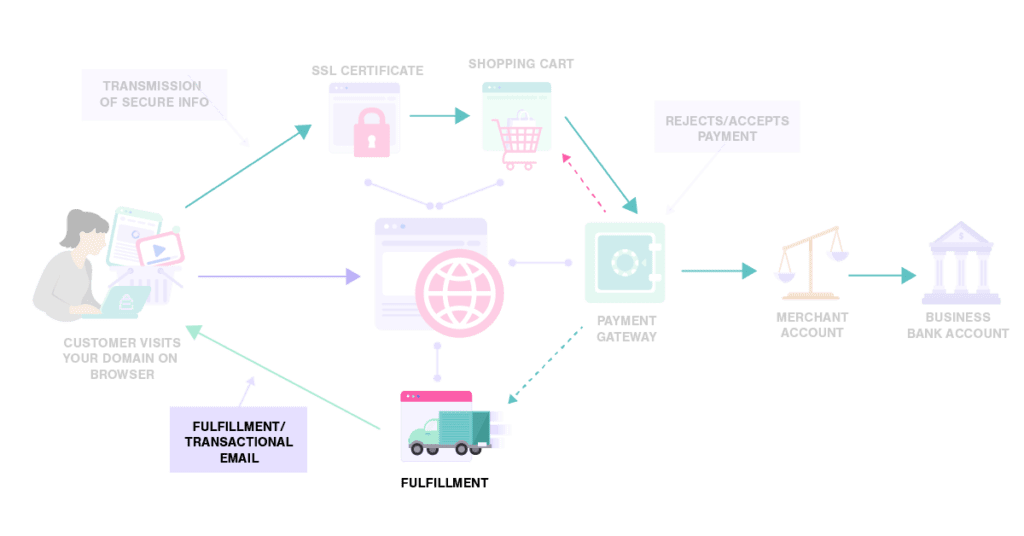Are you ready to learn about the fundamentals of ecommerce warehousing and how it can boost your ecommerce business? This article has everything you need to know!
What Is Ecommerce Warehousing?
Ecommerce warehousing refers to the storage and management of products in a warehouse specifically designed for online retailers. As the backbone of any ecommerce business, it plays a crucial role in ensuring smooth operations, efficient order fulfillment, and customer satisfaction.
Efficient warehousing is essential for several reasons. Firstly, it allows businesses to store inventory securely and organize it effectively, enabling quick access and retrieval when orders are placed. This helps minimize order processing time and ensures timely delivery to customers.
Ecommerce companies need to carefully manage their inventory to ensure that they can meet customer demand. This should happen across all online sales channels to not waste money on overstock or slow moving items.
An effective ecommerce warehousing strategy is vital for the financial health of your business. It can even improve customer satisfaction by reducing backorders and shipping delays.
Types of Warehouses for Ecommerce

Public Warehouses
Public warehouses are storage facilities available to the general public. These warehouses are the most common. They are easy to use for most ecommerce companies, offering convenience and availability.
The basics of ecommerce warehousing revolve around storing physical inventory for an online store. Once a customer’s order is placed, the ecommerce platform passes that information to the warehouse. Then it can be picked, packed, and shipped to the customer.
The cost of using a public warehouse depends on the needs of your inventory. Examples include:
- size of units
- quantity
- special requirements
Warehouses in the public sector generally have insurance coverage to protect from damage or loss. To ecommerce wholesalers and other high-volume companies throughout the entire ecommerce industry, this is a popular option.
Private Warehouses
Private warehouses are facilities that only serve entities contracted with them.
Some private warehouses have special features. Refrigeration units for storing perishable items or hazmat protections are common examples. A private warehouse may have different rules and regulations regarding access, security, and insurance.
They may also not be accepting new clients at all times. However, they are often more willing to negotiate terms.
Cooperative Warehouses
A cooperative warehouse is owned and operated by a group of people in a joint venture. The idea is to pool resources in order to give members access to services they would not otherwise have.
Co-op warehouses are typically owned by a group of businesses who share a common interest. There are benefits to owning their own storage facility rather than contracting one.
By pooling their resources, cooperative warehouses can provide their members with significant advantages.
Consolidated Warehouses
A consolidated warehouse stores inventory for multiple clients in a single facility. The inventory is usually managed by a third-party logistics (3PL) provider. They are responsible for receiving, storing, and sending out the products.

This is a good ecommerce logistics strategy for companies that want to prioritize flexibility and efficiency. If your inventory levels often fluctuate, this option can save you money and reduce your environmental impact versus leasing an oversized warehouse.
Distribution or Fulfillment Centers

A distribution center refers to a warehouse designed specifically for storing and distributing goods.
With the surge in ecommerce, the demand for distribution centers has soared. Online retailers require spaces to store and ship their merchandise effectively. Fulfillment centers are typically highly automated. Robotic automation systems move and sort stock. This helps to improve accuracy and reduce operating costs. Check this list of fulfillment providers if you are looking to scale up operations.
On-Demand Warehousing
On demand warehousing has emerged as an approach to rent storage space whenever required. This innovative business model is gaining popularity due to its ability to help companies minimize inventory expenses and reduce their environmental impact.
It is particularly advantageous for businesses with varying or seasonal storage requirements. On demand warehousing offers increased flexibility and fluidity.
Companies can easily adjust their storage requirements as their needs change. This can reduce operating costs compared to purchasing or leasing unneeded space to future-proof against growth or the busy season.
Bonded Warehouses
Bonded warehouses are a place where imported items are held until duties are paid. This makes them much more common for importers and international companies. Bonded warehouses are regulated by customs authorities and are often government warehouses.
To keep goods in a bonded warehouse, companies may need to obtain a bond from a surety company. The bond guarantees that the business will pay the duties on the goods when they are removed from the warehouse.
Businesses must also obtain a license from the customs authority to operate a bonded warehouse.
What Is Ecommerce Warehouse Management?
Ecommerce warehouse management involves the entire process of storing, picking and packing products to fill customer orders. There are several essential steps and best practices that you can use to manage inventory and pick and pack orders more efficiently.
One of the most common strategies is batch picking. This involves using one picker to collect multiple orders simultaneously using separate totes. This reduces travel time, which can greatly reduce how long it takes for pickers to complete multiple orders.
Warehouse Management Systems
A Warehouse Management System (WMS) is a kind of software used for inventory control. It includes picking and sending out orders. They bridge your website and ecommerce shipping carriers to streamline your overall process and reduce errors. They may also be called ecommerce warehouse management software or an ecommerce inventory management system.
A WMS can automate aspects of the ecommerce fulfillment process and reduce costs significantly. An ecommerce WMS can also make a warehouse more efficient by allowing you to create custom layout plans and optimal picking paths.
Many WMS also include inventory management software. These provide statistics on inventory counts, inventory turnover rates, forecasting, and more. It makes it easy for ecommerce businesses to analyze their inventory. This way they can better control stock issues and reduce operating costs.
Benefits of Ecommerce Warehousing
Ecommerce warehousing offers a lot of advantages if well adapted to your supply chain. These include faster fulfillment, greater security, and more control over your growing stock levels.
Efficient management of your warehouse can boost profitability by minimizing operating costs such, as labor, shipping expenses, delivery durations and storage charges.
Consequently, having an efficient warehouse management system is important for your company’s profitability. Leveraging the benefits of a well-planned warehousing solution will allow you to maximize space and improve the efficiency of your supply chain.
What to Look for in an Ecommerce Warehouse
A lot of factors can impact the availability and preferences of your ideal warehouse. Here are some of the main considerations that apply in most every case:
Market Accessibility Proximity
It is helpful to keep your ecommerce inventory in warehouse locations near your online shoppers. This can save you money and speed up your shipping methods.
For many companies, this means spreading inventory across a network of distribution centers. You can achieve this by outsourcing to a fulfillment services company like ShipBob. Working with a third-party fulfillment solution ensures scalability as your business grows.
Opting for a location in a major city is usually more expensive. However, it can improve shipping speeds as you are closer to major transportation hubs and more populated regions.
Adequate Space
As your volume of online orders and SKUs grows, it is important to future-proof your storage space.
Ecommerce retailers typically need three times as much warehouse space as traditional warehouse clients. This is partly because they are handling more SKUs and need them to be immediately available. By leasing available warehouse space on a flexible, on-demand basis, these businesses can manage seasonal inventory levels with less waste.
Beyond having ample space for inventory, a warehouse must also accommodate warehouse employees. The right warehouse solution is vital for ensuring efficient order fulfillment and shipping capabilities. Ensure your warehouse has the appropriate equipment, climate control, and cleanliness to safely handle your products.
Knowledgeable Staff
Whether starting your own ecommerce warehouse or trying to find an established company to manage your products, a capable staff is important. A knowledgeable and experienced staff makes for smoother warehouse functions. This can reduce errors, damage, and inventory shrinkage.
FAQs
Choosing the Right Ecommerce Warehousing Option for Your Business
Growing a successful ecommerce store takes more than just a great product. You also need to be able to store and ship your products quickly, accurately, and affordably. For many companies, that means working with a warehousing and fulfillment partner.
You may consider using a shared warehouse if you have a limited budget. This can be a good option for startups. However, it’s important to know that you will have less control over your inventory and shipping procedures.
Having control, over your operations is advantageous. It also necessitates a larger initial investment. This might not be practical if you have a volume of orders.
In the end determining the ideal ecommerce warehousing solution for your business hinges on your requirements and objectives. Take the time to thoroughly assess your options and consider what aligns best with your business needs.









